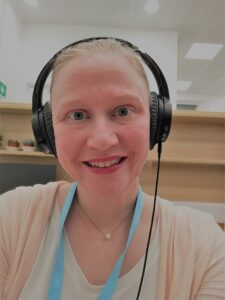Member Insight – Rachel Sippy
 What sparked your decision to become an epidemiologist?
What sparked your decision to become an epidemiologist?
I was unfamiliar with epidemiology or any public health until after I completed my undergraduate degree. I didn’t know anyone with a career in those fields. I was working in a microbiology lab and we were trying to understand why a certain strain of Campylobacter had become ubiquitous in our sheep abortion samples (Campylobacter can cause sheep abortions). We had sequenced the genome and its sequence wasn’t particularly different from our lab strain. I kept asking my boss about what we knew about the sheep farms, the conditions of the sheep pens, and where the sheep had come from, and he kept telling me, “We don’t study that; that’s an epidemiology question”, and I thought that might be what I should study. At a conference, I made sure to attend talks given by researchers in public health and epidemiology and was fascinated by their work. This inspired me to pursue an MPH and then a PhD in Epidemiology.
What do you see as the biggest obstacle facing epidemiologists in the next five years?
Over the past two years, we’ve been thrust into the spotlight and heavily criticized regarding recommended responses to the pandemic. Before this, I don’t think the average person knew much about the field of epidemiology and its purpose, so I’m not sure what the public thinks of us now. Maybe some people are grateful but there were a lot of harsh critiques. Public perception impacts us in how we engage study participants, make policy recommendations, and recruit students into our field. As epidemiology continues to modernize and we adapt new ways of thinking, we all need to be aware of what falls into the wheelhouse of epidemiology, what we value, and best practices. We need to know what we are before we can tell the public who we are.
Do you have any pets?
I have two greyhounds, Gus and Winnie, and a cat named Ina. Gus and Winnie are retired racers, and I rescued Ina from the pier outside Machala, Ecuador. Gus and Winnie were very surprised to have a kitten.
Why did you join SER? What keeps you coming back?
I joined SER because it was clear to me that SER is where all the major conversations in epidemiology are happening, and I want to be part of those conversations. The people are great, the resources (SERTalks, SERDigital, SERLists etc) are really helpful, and the meeting is so much fun! I always leave feeling energized and inspired.
What advice do you give students who want to become epidemiologists?
I would say to try out the different sub-fields of epidemiology and get a better sense on which areas you would like to focus. Causal models? Predictions? Surveillance? Mixed methods? Specific health conditions or exposures? You can’t be an expert in everything, so make sure you really enjoy what you study and learn how to work well with others. Keep talking to people throughout your education and in the years following. I would also encourage you to get involved in SER. There are lots of committees and there is always a need for volunteers for events. I started out volunteering at meetings and now I am a co-chair of the Communications Committee. It’s been an excellent opportunity to meet epidemiologists with a wide variety of interests.
Outside of epidemiology what do you enjoy doing?
I am always knitting several projects, mostly sweaters. I love card games, jigsaw puzzles, and strategy board games (Agricola and Tokaido are favorites). I’m always up for camping, hiking and cycling!
What is something that not many people know about you?
I used to own a school bus. Ask me about it at the next meeting!
